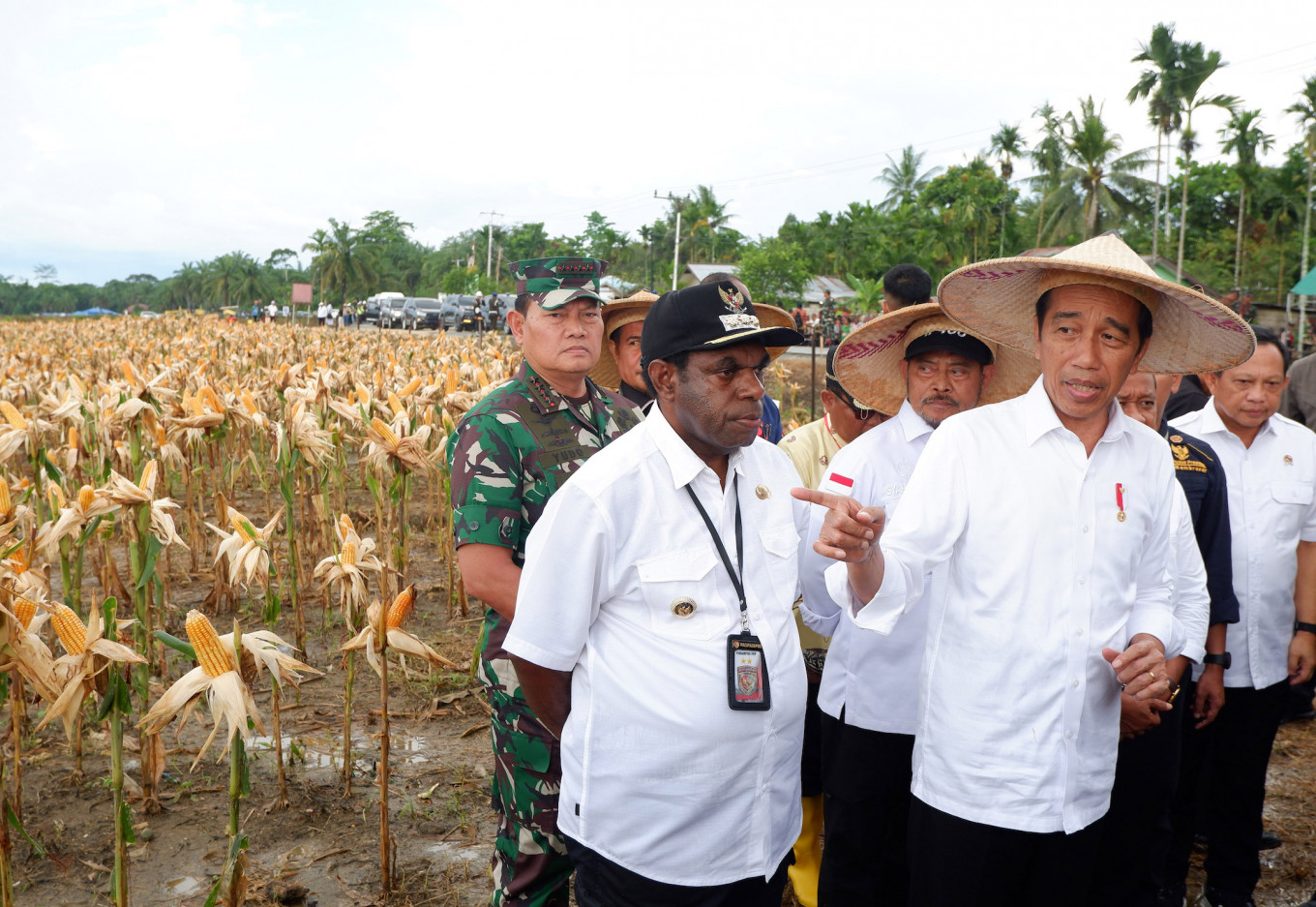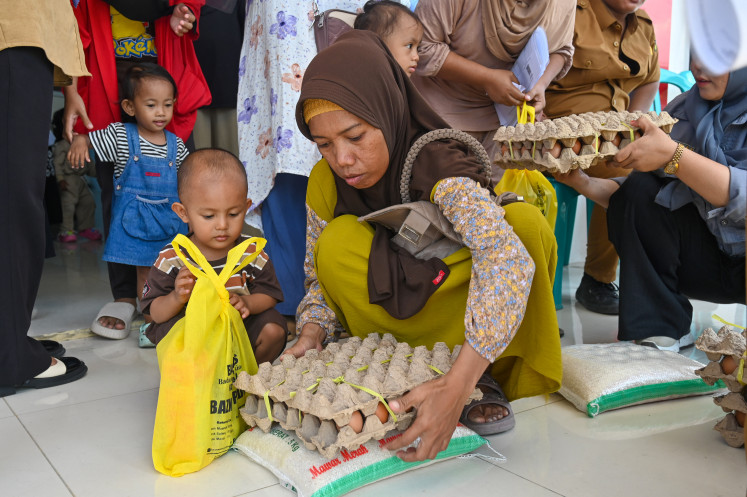Popular Reads
Top Results
Can't find what you're looking for?
View all search resultsPopular Reads
Top Results
Can't find what you're looking for?
View all search resultsFood estate for thought
These are two serious accusations made in public that should not be easily dismissed. One is the destruction to the environment caused by the food estate program, and the other about possible embezzlement and other financial irregularities.
Change text size
Gift Premium Articles
to Anyone
 President Joko 'Jokowi’ Widodo (right, in foreground) speaks to Keerom Regent Piter Gusbager (left, in foreground) after harvesting corn at a food estate in Wambes village in Keerom’s Mannem district on July 6, 2023. The first harvest at this particular estate has managed to produce 7 tonnes per hectare of produce, higher than the national standards of 5.6 tonnes per ha and enough to reach corn sufficiency in eastern Indonesia. (Antara/Sakti Karuru)
President Joko 'Jokowi’ Widodo (right, in foreground) speaks to Keerom Regent Piter Gusbager (left, in foreground) after harvesting corn at a food estate in Wambes village in Keerom’s Mannem district on July 6, 2023. The first harvest at this particular estate has managed to produce 7 tonnes per hectare of produce, higher than the national standards of 5.6 tonnes per ha and enough to reach corn sufficiency in eastern Indonesia. (Antara/Sakti Karuru)
F
or what it’s worth, the scathing attack against President Joko “Jokowi” Widodo’s food estate program, from no less than the Indonesian Democratic Party of Struggle (PDI-P), gives us a rare glimpse of what a democracy should look like.
Every government program, especially one involving huge sums of money, must be scrutinized to ensure good governance and accountability of taxpayers’ money. We have not seen much of this in recent years since the coalition government is made up of seven political parties, which together control over 80 percent of the seats in the House of Representatives, rendering weak and ineffective the checks and balances mechanism needed for a functioning democracy.
The PDI-P, the largest party in the coalition government, uncharacteristically has called out the government for committing environmental crimes through the massive deforestation caused by the development of food estates by big corporations in various parts of the country. Claiming that the program has failed, PDI-P secretary-general Hasto Kristiyanto called for a thorough investigation into allegations that some of the food estate money had gone into the coffers of political parties.
This is clearly part of the PDI-P’s political maneuvers six months before the presidential election, taking a distance from the President as well as taking a poke at Defense Minister Prabowo Subianto, one of the presumptive presidential candidates. Jokowi entrusts Prabowo’s ministry to manage a large part of the food estate program. A private contractor for the program is linked to Prabowo’s party Gerindra, which is also a member of the coalition. The PDI-P’s candidate, Central Java Governor Ganjar Pranowo, is head-to-head with Prabowo in most public opinion polls.
Putting aside the PDI-P’s motives, we welcome the opportunity to take a thorough look at the food estate program, which is an important part of President Jokowi’s food security strategy. The program is to develop plantation estates, mostly but not exclusively for rice, to make Indonesia less vulnerable to volatile prices in the global markets for these commodities.
Indonesia has largely relied on smallholder farmers to produce most of its rice, but with land becoming scarcer, and many farms becoming smaller and smaller to be able to produce surplus, the government is turning to big businesses to help produce food and to feed the population, put at more than 270 million and growing by 3.3 million each year.
Jokowi launched the program in 2020 and so far, the results have been mixed, some already reaping harvests, while others encountering problems and opposition on the ground. In Central Kalimantan, the program is developing a total of 30,000 hectares for rice and other commodities. In North Sumatra, it is developing a horticulture industry. In East Nusa Tenggara and in Papuan provinces, the program focuses on planting corn and sorghum crops.
Amid the growing criticism, Jokowi has defended the food estate program, saying it involved several ministries including public works, agriculture as well as defense. He admitted some harvest failures, but stressed that this was normal for the first few years in plantation farming. He did not specifically address Hasto’s “environmental crime” charge, but said the program was continuously evaluated, corrected and improved.
In his accusation, Hasto cited the Financial Transaction Report and Analysis Center (PPATK) report on the flow of funds worth Rp 1 trillion (US$66 million) from what it calls an “environmental crime” to a political party. Many associated the PPATK statement with the food estate program and Hasto has demanded that the center name the offending party. Hasto also questioned the direct appointment of privately owned PT Agro Industri Nasional, which is run by friends and supporters of Prabowo, to handle the food estate project.
These are two serious accusations made in public that should not be easily dismissed. One is the destruction to the environment caused by the food estate program, and the other about possible embezzlement and other financial irregularities.
As a final food for thought for a functioning democracy, more people should be calling out the malpractices in government agencies and ministries that are run by politicians from political parties in the coalition government, including from Hasto’s own PDI-P.
Your Opinion Matters
Share your experiences, suggestions, and any issues you've encountered on The Jakarta Post. We're here to listen.
Thank you
Thank you for sharing your thoughts. We appreciate your feedback.









